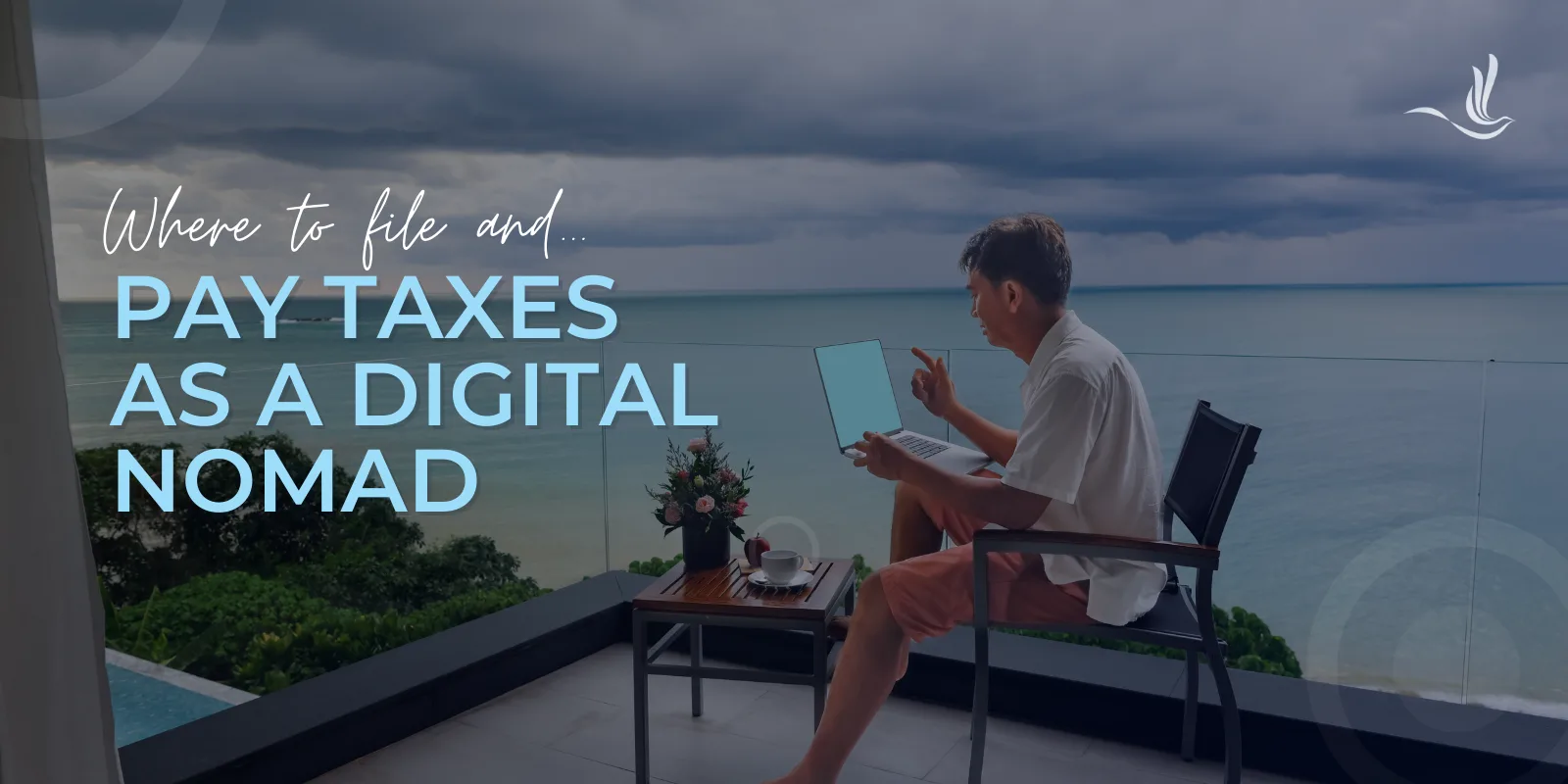The rise of digital nomadism has transformed how people work, allowing individuals to earn an income while traveling the world. However, while the freedom to work from anywhere is appealing, it also raises complex tax questions. Digital nomads must determine where they are required to file taxes, which country has the right to tax their income, and how to avoid double taxation. Without proper planning, they may face unexpected tax liabilities and legal complications.
Understanding tax residency, local tax laws, and international tax treaties is essential for any digital nomad. Filing and paying taxes correctly ensures compliance while also optimizing tax obligations to avoid unnecessary costs. This guide will help you understand how digital nomad taxes work, including tax residency rules, filing abroad, and avoiding double taxation with expat tax benefits.
Determining Tax Residency
For digital nomads, understanding tax residency is crucial as it determines where they must report and pay taxes. Each country has its own criteria for tax residency, which can significantly impact tax obligations.
Understanding Tax Residency Rules
Tax residency determines where an individual must report and pay taxes. It is separate from citizenship and is based on where a person lives and works for a significant portion of the year. While tax residency rules vary by country, a common standard is the 183-day rule. Many countries consider an individual a tax resident if they spend more than 183 days in a given year within their borders.
Some countries also use other factors to establish tax residency, such as the location of permanent home, economic ties, and personal relationships. For example, if a digital nomad owns property or has a family in a country, that jurisdiction may claim tax residency even if they do not meet the 183-day rule.
Tax Residency Examples
The United Kingdom determines tax residency based on the Statutory Residence Test, which considers time spent in the country and significant ties, such as family or business interests. In contrast, Australia has a “resides test” that assesses whether an individual has a permanent home or social and economic ties there.
In Portugal, tax residency is determined by the 183-day rule, but the country also offers a Non-Habitual Resident (NHR) program, allowing foreign income to be taxed at reduced rates for new residents. For digital nomads who frequently travel between countries, it is crucial to track time spent in each location to avoid unintentionally triggering tax residency in multiple jurisdictions.
Filing Taxes as a U.S. Digital Nomad
U.S. citizens and green card holders must file taxes on their worldwide income, regardless of where they live. Understanding how to comply with U.S. tax laws while benefiting from available tax exclusions is key to minimizing tax burdens.
U.S. Citizenship-Based Taxation
Unlike many other countries, the United States taxes its citizens and green card holders on worldwide income regardless of where they live. A U.S. digital nomad must file a Form 1040 annually, reporting all income earned worldwide, even if they have not lived in the U.S. for years.
Tax Benefits for U.S. Expats
The IRS provides two primary tax relief options for U.S. digital nomads to avoid double taxation:
Foreign Earned Income Exclusion (FEIE): This allows eligible taxpayers to exclude up to $126,500 (for tax year 2024) of foreign-earned income from U.S. taxation. This amount increased to $130,000 for tax year 2025. To qualify, the taxpayer must either meet the Physical Presence Test (spending at least 330 days outside the U.S. in a 12-month period) or the Bona Fide Residence Test (establishing permanent residency in a foreign country).
Foreign Tax Credit (FTC): If a digital nomad pays taxes in another country, they can use the Foreign Tax Credit to offset U.S. tax liability. This is particularly useful for those who do not qualify for the FEIE or earn above the exclusion limit.
Additionally, digital nomads with foreign bank accounts exceeding $10,000 must file a Foreign Bank Account Report (FBAR) to comply with U.S. anti-money laundering regulations.
Tax Considerations for Non-U.S. Digital Nomads
Digital nomads who are not U.S. citizens must navigate the tax laws of their home country and the countries where they live and work. The way a country taxes its residents can significantly impact a digital nomad’s tax obligations.
Worldwide vs. Territorial Tax Systems
Countries follow different taxation systems. Some, like the U.S., impose worldwide taxation, meaning residents must pay tax on all income, regardless of where it is earned. Others, such as Panama and Hong Kong, follow a territorial taxation system, taxing only income sourced within their borders.
Tax Treaties and Double Taxation Agreements
Many countries have double taxation agreements (DTAs) to prevent residents from being taxed twice on the same income. For instance, a German citizen working remotely for a U.K. company while living in Thailand may use the tax treaty between Germany and Thailand to determine where taxes should be paid.
For digital nomads, choosing to reside in a country with favorable tax treaties can significantly reduce tax burdens. Countries like Portugal and Malta have extensive tax treaty networks that prevent excessive taxation for foreign residents.
Paying Taxes While Living Abroad
For digital nomads, understanding when and where taxes are due is essential to avoid penalties and remain compliant. Tax obligations depend on residency, the source of income, and local tax laws.
When and Where Digital Nomads Owe Taxes
A digital nomad may owe taxes in their country of tax residency, the country where they earn income, and their home country if applicable. If working remotely for a U.S.-based company while living in Spain, the Spanish tax authorities may claim tax residency if the individual stays long enough.
Handling Self-Employment and Social Security Taxes
For self-employed digital nomads, tax obligations extend beyond income tax. Many countries require freelancers to contribute to social security, even if they are working remotely for a foreign company. U.S. self-employed digital nomads, for example, must still pay self-employment tax (15.3%) unless they qualify for a Totalization Agreement, which allows them to contribute to the foreign country’s social security system instead.
Example Scenario
Let’s look at an example of how a digital nomad, Sarah, would pay taxes. Sarah is a U.S. citizen who works remotely for a U.S. company. She’s a freelance graphic designer and earns income from various clients. In 2024, Sarah decides to travel and live in different countries while continuing her work. She spends 6 months in Spain, 4 months in Mexico, and 2 months in Bali, Indonesia.
U.S. Tax Obligations
Worldwide Income Reporting: As a U.S. citizen, Sarah is required to report her worldwide income on her annual U.S. tax return, regardless of where she lives or works. This includes income earned from clients in Spain, Mexico, Bali, and any other country.
Foreign Earned Income Exclusion (FEIE): To avoid double taxation, Sarah can potentially exclude up to $126,500 of her foreign earned income (for 2024) using the Foreign Earned Income Exclusion (FEIE) if she meets the requirements. She must either pass the Physical Presence Test (being in a foreign country for 330 days within a 12-month period) or the Bona Fide Resident Test (living in a foreign country for a full year).
Self-Employment Taxes: Since Sarah is a freelancer, she is subject to self-employment tax (15.3%) on her net earnings, even if she claims the FEIE. However, she can potentially reduce this by paying into foreign social security systems if the country she’s in has a Totalization Agreement with the U.S. (which would prevent her from paying social security taxes in both countries).
Spanish Tax Obligations (During 6 Months in Spain)
Tax Residency Rules: In Spain, if Sarah stays for more than 183 days during the calendar year, she would be considered a tax resident and would need to report her worldwide income to the Spanish tax authorities. If she stays for less than 183 days, she is likely considered a non-resident and will only be taxed on income earned in Spain.
Spanish Tax Rates: As a tax resident, Sarah would pay Spanish income tax on her global income, with progressive rates up to 47% depending on her earnings. As a non-resident, she would be subject to a flat 24% tax on any income earned in Spain, such as from local clients.
Tax Treaties: The U.S. and Spain have a tax treaty that can help prevent double taxation. Sarah may be eligible for a tax credit for the Spanish taxes she pays, which could reduce her U.S. tax bill.
Mexican Tax Obligations (During 4 Months in Mexico)
Tax Residency: If Sarah spends more than 183 days in Mexico in a calendar year, she could become a tax resident and be taxed on her worldwide income. If she stays less than 183 days, she is considered a non-resident and would only be taxed on income earned within Mexico.
Mexican Tax Rates: Non-resident tax rates are typically flat (around 30% for income earned in Mexico). Sarah would need to file a non-resident return for the time she spent in Mexico if she earned income from Mexican clients.
Tax Treaty Benefits: The U.S. and Mexico also have a tax treaty, which may help Sarah avoid double taxation on the same income. She could claim a foreign tax credit on her U.S. tax return for any taxes paid to Mexico.
Indonesian Tax Obligations (During 2 Months in Bali, Indonesia)
Tax Residency in Indonesia: Sarah would not likely become a tax resident unless she stays more than 183 days. As a non-resident, she would be subject to a 20% tax on income earned in Indonesia, if any, from Indonesian clients.
No Tax Treaty: Indonesia does not have a tax treaty with the U.S. to mitigate double taxation, but she may still be able to deduct taxes paid in Indonesia on her U.S. tax return through the foreign tax credit.
Tax Credits and Deductions
Foreign Tax Credit: Sarah can claim a foreign tax credit on her U.S. tax return for taxes paid to Spain, Mexico, and Indonesia. This helps avoid double taxation by reducing her U.S. tax liability based on the taxes paid to these countries.
Self-Employment Deductions: Sarah can also deduct business-related expenses on her U.S. tax return, such as travel, software subscriptions, and office supplies.
Filing in Multiple Countries
Sarah would need to file tax returns in the U.S., and possibly in Spain and Mexico, depending on her residency status in each country. These returns would declare her income and account for any tax credits or exclusions. Also, if Sarah maintains ties to a particular U.S. state, she may still be required to file a state tax return and pay state taxes. Some states have stricter residency rules than others, so Sarah would need to consult a tax professional to determine her state obligations.
It’s important to note that income earned in different currencies needs to be converted to U.S. dollars for reporting purposes, which may involve additional complexities. Also, if you pay into foreign social security systems, you should be aware of how those payments impact your U.S. benefits. This is especially true in countries with no Totalization Agreement.
Common Tax-Friendly Countries for Digital Nomads
Some countries offer tax incentives for digital nomads, making them attractive places to live and work while minimizing tax liabilities. Several countries have introduced digital nomad visas with favorable tax conditions. Portugal’s NHR program allows foreign residents to benefit from reduced tax rates. Georgia’s Individual Entrepreneur Program offers a flat 1% tax rate for freelancers earning under $155,000 annually. Thailand’s Long-Term Residence Visa provides tax incentives for remote workers earning over $80,000 annually. These programs offer a structured way for digital nomads to maintain legal tax compliance while minimizing tax liabilities.
Strategies for Managing Tax Obligations
Proactively managing taxes as a digital nomad can prevent costly mistakes and legal issues. Keeping accurate records and working with professionals can help optimize tax strategies.
Keeping Accurate Records
Digital nomads should maintain detailed records of their travel history, income sources, and tax payments. Apps like Nomad List and TaxDome help track days spent in each country and expenses for potential deductions.
Consulting Tax Professionals
Given the complexity of international tax laws, digital nomads should work with tax professionals specializing in expatriate taxation. Experts can help optimize tax strategies, ensure compliance, and leverage tax treaties to minimize liabilities.
Using Tax Software and International Tax Services
Tax software like TurboTax and Nomad Capitalist provides tools for expat tax filing. Some digital nomads also use international tax services like Greenback Expat Tax Services to handle cross-border tax complexities.
Tax Help for Digital Nomads
Navigating tax obligations as a digital nomad can be complex, but proper planning helps prevent unexpected liabilities. Understanding tax residency rules, leveraging tax treaties, and choosing favorable jurisdictions are key to minimizing tax burdens. By keeping accurate records, seeking expert advice, and utilizing tax benefits like the Foreign Earned Income Exclusion, digital nomads can legally optimize their tax situations. Staying proactive ensures compliance while allowing them to enjoy the freedom of a location-independent lifestyle without financial surprises. Optima Tax Relief is the nation’s leading tax resolution firm with over a decade of experience helping taxpayers.
If You Need Tax Help, Contact Us Today for a Free Consultation




























